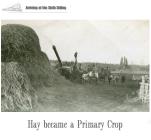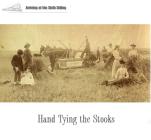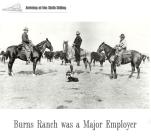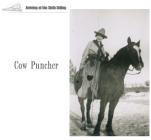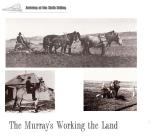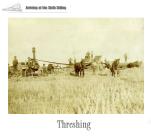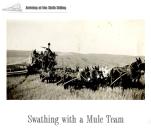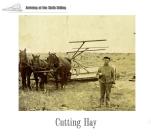1
Working the Land: To prove the patent the settlers had to clear the land, plant crops, raise livestock, and live on their quarter for 6 months of the year. As the years go on the harvesting technology improves allowing larger yields.2
The 'walking plow' the early homesteaders used to break the sod to complete their land patent.1903
Olds NWT Canada
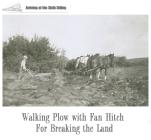
5
Burns Ranch:See Olds First states:
"Pat Burns, chief contractor for supplying beef to the railway construction camps… was finding it hard to get steady supplies. Grass feds all sold in the fall…
Burns saw the necessity of winter-feeding. The district east of Olds (still the sixth siding) being a prairie wool country, and receiving a more abundant rainfall than the rangelands father south, produced a heavy crop of hay, so here Burns established his first ranch, or winter feeding experiment, about 1890, when he was supplying beef to the construction crews on the Calgary and Edmonton line.
Buildings for the first Burns ranch were located on Section 23, township 32, range 28, west of the 4th Meridian, about nine miles east and two miles south of Olds. The second ranch or the "South place" was about six miles farther south." (Note there is no official record of this ownership)...
Settlement made its eventual encroachment. Burns abandoned these original sites and moved father east, where he had several other camps, with open springs, near his feed supplies, the main ranch then was near present Allingham. Henry Ettinger was ranch foreman at this location for many years. About 1912 Burns leased the Reid ranch and placed Emil Hoschka as foreman there."
According to A History of Olds:
"Mrs. Gamble remembers that Pat Burns would come by train from Calgary, then be driven out from Olds in a hired rig, generally bring a toy or book for the children. He and his partner Mr. Duggan (in their fur coats) used to walk among the cattle without fear. "Don't look at them", Burns would warn " or they'll chase you".
6
Settlers soon found beef cattle and dairy cattle thrived in the Olds district.1900
Olds NWT Canada
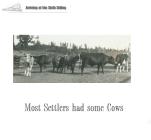
7
Manitoba Free Press 1904 June 25 Olds supplement:"Thousands of cattle range over the prairie and during the winter months it is not at all necessary to house them, though better to put up a small amount of feed. Shorthorns, Herefords, Polled Angus being the chief breeds. There is always a large market, the supply never being able to equal the demand for good beef cattle."
9
THE RED LODGE RANCH - from "The Lone Pine" by Jack Inglis, ca 1948 [copy at Olds Museum]The Red Lodge Ranch was acquired by homestead and purchase while in its virgin state by Mr. Thomas Critchley who in 1894 filed on the south west of Twenty, Thirty Four, Two, W. of Five. This quarter he later cancelled and filed on the North East of Eighteen which he traded to the Calgary & Edmonton Land
Company for the South East of Nineteen same range and township as the other quarters and this became the nucleus of his ranch. The ranch lay directly across the Little Red Deer River from the north end of Murray Valley. Tom Critchley, by the way was one of three brothers who had immigrated to the western
prairies early in the nineties, Tom settling on the land above described while simultaneously his brothers, Oswald and Harry established themselves on locations west of Calgary. Mr. Critchley had all his ranch buildings, i.e. dwelling
house, barns, sheds, corrals etc. substantially constructed of spruce logs from off his own or tributary lands and it can be said truthfully that for neatness of arrangement and craftsmanship it would rank second to none elsewhere in Alberta. It was deemed by Mr. Critchley that the pleasing desirability of location
was more important to him than its utility value and thus the alluring beauty of the surrounding landscape rested in the glowing aura of poetic charm.
The site Mr. Critchley had chosen for his ranch buildings was apparently an ancient wide river bottom or bed at the base of a high embankment, supposedly the left bank of a river that might have been a prehistoric
course of the present Big Red Deer River. The rear of the big log dwelling or manor sat in closely to this embankment and fronted a pretty little lake about one hundred and fifty yards distant. The water of the lake
had been fashioned by Nature's Smithy into a horse-shoe at least Nature had outlined it into the shape of one and it was by its shape that the Critchleys were inspired to name it `Horse Shoe Lake' a name that couldn't have been any more suitable in description and the water of the lake, to use a simile, was like the
iron of a horse-shoe, and nowhere was it much more or much less than one hundred yards across from shore to shore. Its length around the U was a little over a mile from heel to heel; and too, the heels were almost equidistant
from the toe which in turn was directly in front of the manor door. Such precision is so unusual as a rule on. Nature's draft board when delineating common things but when it is there, it is beautiful.
The land within the U was covered with ever-green trees, mostly spruce, but the general out line of the lake was open prairie. Summer months brought its quota of water fowl, even a couple of loons made it their summer home and often very early in the mornings wakened the house-hold with their screamings. One might easily imagine as he looked over the natural picture before him from the front veranda of the house that they were looking at an oversized jewelled ornament with a huge emerald setting within a circle of turquoise, while others again, especially if they were Irish might think of it as a little bit of Ireland encircled by a strip of the deep blue ocean.
Mr. Critchley brought a daughter of Sir Sanford Fleming to Red Lodge as his wife, personally I never thought she was very well adapted to the responsibilities of a ranchers wife, or to a country life in any of its aspects. However her father Sir Sanford was a man who had distinguished himself in several large economic developments with an expanding profit return established on James Street, Montreal. More particularly though Sir Sanford had won fame for himself as the man who worked out the system of Standard Time and then had it accepted for around the world use by the International Prime Meridian Conference in 1884 besides persuading the Conference to accept Greenwich as the initial Meridian line. This generous father-in-law according to rumor made the Critchleys a wedding present of about one hundred pure bred hereford cows and
the necessary sires for the herd and with the nice bunch of horses Mr. Critchley had acquired before he was married made for this small ranch a real classic. Nor did the Red Lodge Ranch lack any of the minor accoutrements associated with such a sporty establishment. They had beside their aristocratic herd of cattle
and their more or less nondescript bunch of horses, hogs, sheep, poultry, etc-etc around the barnyard, and a good supply of farm machinery and other necessary equipment. Tom always had three or four dogs of indifferent breeding to keep he and his wife company while they were riding around their estate on routines
of inspection. The Critchleys lived very much to themselves, at least as far as associating with their neighboring homesteaders was concerned. Mrs. Critchley seemed to demand a superior social position than what the neighboring element provided yet she lacked the dramatic ability to put it over graciously or the
necessary "esprit d'honnetete" to be excused for not doing so.
I couldn't say whether the four canine monstrosities were kept on the ranch for the sole purpose of following their masters ponies, or by their having long ears and an eeried howl they would best indicate the sporting proclivities of the ranch owners, but this I do know, these dogs had a wonderful appetite
for barnyard fowl and if one of them ever worked its way into the chicken yard and could grab an unsuspecting chicken or an old hen, the difference didn't `add up' with them, they would have it before it could say good-bye to its
frustrated companions, its poor little body crushed between the friend's jaws and its poor little spirit on its way to the Silver Glades of the birds Paradise before one could say `Jack Robinson.' Mr. Critchley, if he heard the racket in the chicken yard would dash down in time to catch the dog in his nefarious act and
repossess the chicken while yet there was time. The chicken wasn't an economic loss exactly for Tom would add it to his stock of Poultry or wild game food supply to ripen. This repose for the edible birds was on the rear wall of
the manor well out of his dogs reach.
Jimmie Jensen, one of our Danish homesteaders and a very efficient workman was the Red Lodge Ranch foreman, and often the only man on the job. One time Jimmie had quite a stretch of fencing to build
besides his other work of an incidental nature so he asked Mr. Critchley to hire me as a help. In addition to the man help the Critchleys kept a maid to do the cooking and general house work. We three, being servants
had our meals in the kitchen. I thought this quite a novelty even though the china service used on our table was ironclad and the silver was from the Cornish mines of England. This kind of table ware didn't matter to me, being young and strong all I was interested in was enough food to eat, yet I discovered one day at
Critchleys that this insatiable desire can have its limits. Jimmie and I had gone in for our mid-day meal when there was a roasted domestic fowl on the table along of course with the usual vegetables etc. The maid told us to go
ahead with our dinner and we did just that. Jimmie began by cutting a ration for himself from the fowl in question, accomplishing this he handed the platter and fowl to me at the other end of the table. I wouldn't like to suggest that I was beginning to `smell a rat' but I was aware that I was smelling something
strange originating nearby. Concluding the objectionable odor from that fowl would continue to besiege my undefended nostrils but before they had to capitulate I removed the cause over to the maids working table and
made my meal from vegetables. I suspicioned that the maid had reported my lack of appreciation or my bad behavior to the Critchleys for when I came in to supper I was fired.
Some time after this chicken episode I went back to Red Lodge. The Critchleys having tired of ranching in 1899 sold out to the Stokes Brothers, lock-stock and barrel excepting Jimmie Jensen their reliable manager who went back to his homestead when the Critchleys left for the east.
The Stokes Brothers were young remittance men, William and Frank, born in India at a place called Simla, Sons of Whitely Stokes, chief adviser to the Viceroy of India. Educated in England, graduates of Cambridge University and the Hinkley School of Ranching which was situated at the Beaver
Dam on the Dog Pound west of Carstairs, Alberta. The author of this narrative is not prepared to say whether the Hinkley School was a subordinate adjunct to the Cambridge University of not but he knew that many who took the
years course there were, or had been students at Cambridge. Both the Stokes Brothers has availed themselves of this course and to all intents and purposes were able to master all the intricacies of ranching or (Raunching) as they called it. Unfortunately Frank's mind had been too saturated with Green Philosophies to
give any heed to the ranch so decided to return to the land of his forefathers leaving everything to Billie to do as he wished. Billie then carried on alone for a season. He often rode into Olds for a bit of social life and as the trail went
past our cabin door it meant the occasional drop-in for a chat and smoke with dad, also a cup of tea with a dish of wild preserved fruit, of which he was very fond, tea biscuit or scone of some sort so we soon became happily acquainted. We were always glad when Billie happened along. My brother Robert and I
were both at home at the time Billie was looking for someone to work for him and I took on the job, my second try working at Red Lodge. I hadn't been there many days when Billie, to my surprise, rode in with my brother Bob. He wanted us to lease the ranch for a year and he would live in with us, he wished to be free to come and go as he wished, so the outcome was we took over the ranch under a share contract, having all the pure bred stock - a bunch of horses and all the farm machinery and other essential equipment under our control.
After taking over the ranch everything went along fine. Billie was a prince of a fellow, but far from beingpractical in the rudiments of physical toil, we were always amused in efforts to help with the work. He spent considerable of his time visiting among his girl friends, or over at our place having tea and a
smoke with dad. Within three or four months from the expiration of our contract we found out that Billie had fallen madly in love with a very lovely girl who lived on a farm outside of Olds and after that we didn't see him very often at Red Lodge. Bob and I suspicioned that Billie was running short of current cash to carry on with, remittances from his dad had ceased when he received the transfer for the ranch. Now Billie who had frequently talked freely of his love affairs was always mum about his liquid finances. He hadn't dropped a word
that might have reinforced the sheer web of our suspicion, or that he was ever hard pressed for ready cash, but as the old saying goes, `actions speak louder than words' and if his wordy vocabulary was expressing this need, his
physiotabulary was replete with information thickly spread all over his personality. For several days Billie had acted very nervously about something or other. After finishing a meal he would light his pipe and start on a ten mile or so ambulation, back and forth across the dining room floor explaining to Bob and me the merits,
beauty and virtues of his Sweet Heart of the prairies.
Billie Stokes was a natural clever pencil artist and could have earned considerable cash as a cartoonist in the press office but at that time he had never thought of selling the product of his talents or the labor of his hands for financial gain. Just the same he was a very likable fellow, always the gentleman and
although the only way left for him to raise the much needed currency was from the liquidable assets of his ranch yet he wouldn't think of asking either my brother or myself to rescind our contract no matter how momentous his
need became. However Bob and I realizing that his present circumstances must be very embarrassing to him suggested that if he wished to liquidate part or all of his ranch property that we would wave our contract by taking over our share of increase now due, plus a small bonus to cover re-establishment costs.
These terms were agreed upon and the Inglis interest in the Red Lodge ranch was ended. Billie was not long after getting his Red Lodge assets back into his hands until everything was disposed of. He then married the girl he loved
and took her to visit his people in England for their honeymoon.
That was over fifty years ago. At that time Mrs. Stokes either died or had been divorced and he had gone out to the coast. I never saw him again, nor even heard of him, however by diligent investigation I dug up the account of his death which appeared in a Victoria paper of February 1938. The following
is an extract from that account.
"William Henry Stokes of 438 Dallas Road, Victoria, B.C. a draftsman in the Forest Branch of the Provincial Government, since 1905, passed away yesterday in St. Joseph's Hospital, Victoria, aged 62 years.
Coming to Canada thirty seven years ago he resided for a time at Olds, Alberta, and had been a resident of Victoria thirty three years. He is survived by his widow, one son John A. Stokes, in England, and one daughter
The Red Lodge Post Office that had been established on the ranch was moved across the Little Red River at the time of the ranch sale and Mr. Colin Thompson became the new Post Master.
13
The drought ended, and the 'wet years' changed what the settlers could harvest.1900
Olds NWT Canada
